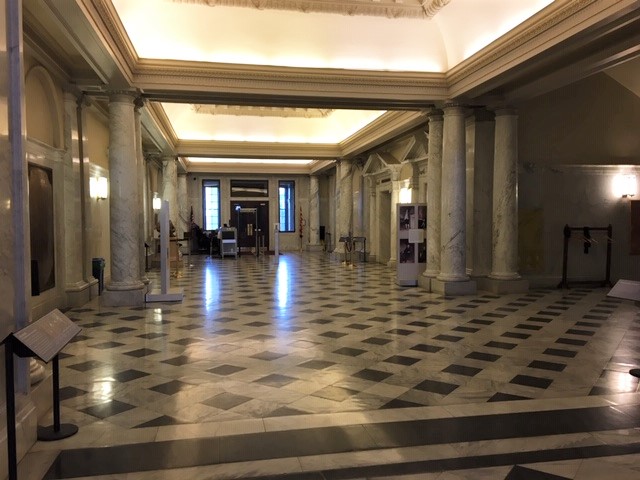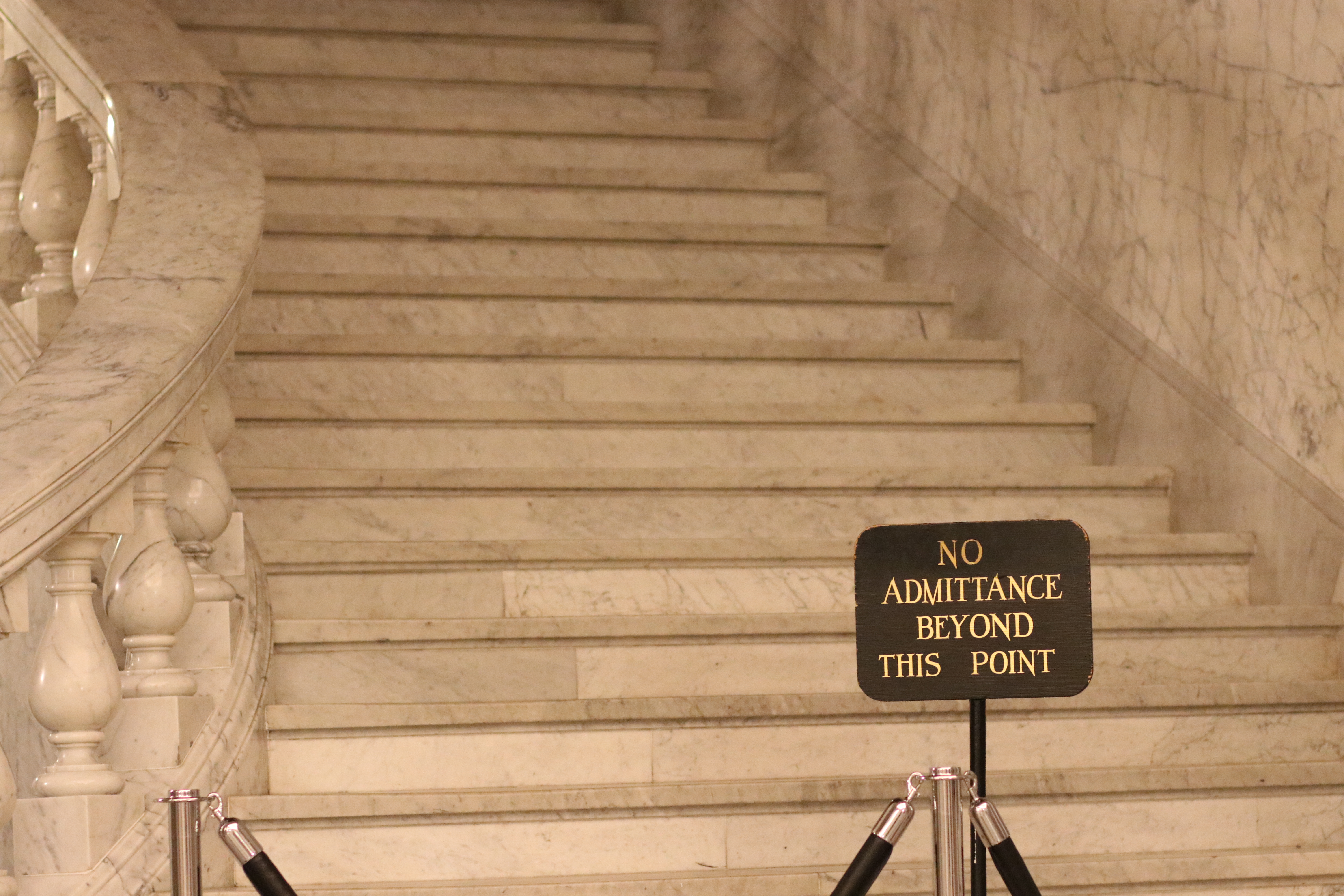Unprecedented Three Days on Tap in Annapolis as Legislators Race to Early Finish

For what is believed to be the first time since the Civil War, the Maryland General Assembly is adjourning early.
Senate President Bill Ferguson (D-Baltimore City) and House Speaker Adrienne A. Jones (D-Baltimore County) announced on Sunday that this year’s legislative session, which was scheduled to conclude on April 6, will end instead on Wednesday.
Lawmakers hope to convene in special session in late May, subject to the spread of COVID-19, Ferguson said. If there is a special session, it will be primarily to override vetoes from Gov. Lawrence J. Hogan Jr. (R). If there are other bills they wish to consider in May, including dead bills from the current session, lawmakers would have to start at square one.
As of Sunday, at least 31 Maryland residents had tested positive for the disease ― and Howard County reported a case of a woman in her 80’s who lives at Lorien Elkridge, a nursing home facility. Last Monday, there were six reported cases.
The legislature’s presiding officers said the decision represented a desire to balance their official responsibilities — primarily to fund state agencies and programs for fiscal year 2021 — against the health risks of staying in the cramped confines of the State House longer than necessary.
“The COVID-19 health crisis is critical,” Ferguson said. “This was not an easy decision to make and was made in consultation with public health experts and lawmakers from both parties.”
In a display of bipartisan solidarity, Republican leaders from both chambers stood with Ferguson and Jones as they addressed reporters during a Sunday afternoon news conference.
“At times like these, it’s important for all of us to know that we must pull together, stay calm, and know that we will get through this together,” House Minority Leader Nicholaus R. Kipke (R-Anne Arundel) said. “So I support the actions of the leaders of the General Assembly. Collaboratively, we are going to get legislation passed to bring forth the resources that we need to address the coronavirus, we’re going to get a budget passed that brings forward resources that we need for the state and to address the crisis. And we’re going to be supporting the administration every step of the way.”
Shortly after the leaders’ mid-afternoon news conference, the Senate and House convened for a rare Sunday session — the first in nearly 30 years — and began approving bills in rapid-fire fashion. Most measures zoomed across the desk with little debate or discussion.
In the House, lawmakers voted several times to change the chamber’s rules to allow the second- and third-reading votes on Senate bills during the same floor session. Around 6 p.m., House Parliamentarian Jheanelle K. Wilkins (D-Montgomery) stood to announce that Jones had issued a directive to send all crossed-over Senate bills directly to standing House committees rather than to the Rules Committee, to speed up the legislative process.
As a practical matter, Monday is no longer “crossover day” in the State House ― the deadline for a bill to move in one chamber and be guaranteed a hearing in the other.
Members of the Senate have introduced 1,081 bills and 236 bond initiatives. Members of the House of Delegates have introduced 1,663 bills and 234 bond initiatives.
Many will not make it — either because leadership doesn’t approve of them or time simply runs out. The decision to adjourn early sets off a scramble for Maryland lawmakers to get their most cherished bills onto the top of the pile.
“We will be essentially condensing the last month of session into three days with a third of the staff,” said the Senate president. “This is going to require us to focus on the most important and prioritize policies.”
Unprecedented budget meeting
The first hour of the Senate’s rare Sunday session saw passage of over 50 pieces of legislation, including a few bills that had already passed in the House.
Several of those bills are now poised to be sent to the governor’s desk — most notably Jones’ House Bill 1260, which would provide an extra $57.7 million annually to fund the state’s historically black colleges and universities.
Should it be signed by Hogan, the bill’s passage would finally put to rest a long-fought lawsuit levied against the state by the Coalition for Equity and Excellence in Maryland Higher Education.
Ferguson thanked the members of the Legislative Black Caucus for pushing the legislation.
“This is not a bill that will improve the lives or opportunities for black Marylanders,” Ferguson said. “This will improve the life of all Marylanders, and it’s something that all of us should have been working for a long period of time.”
On Monday, the Senate Budget and Taxation Committee and House Appropriations Committee will take the unprecedented step of meeting together for budget negotiations before a budget bill reaches the House floor. The goal is to come to consensus on a budget bill that will be able to pass through the House, then move to the Senate for a quick concurrence, lawmakers said.
Also on Sunday, Ferguson and Jones announced the creation of a Joint Committee on the COVID-19 Response. The new panel, made up of 24 lawmakers from both chambers and both parties [see related story], will “monitor the effects of the COVID-19 virus in Maryland and advise the General Assembly in our role as a co-equal partner in government in oversight and lawmaking roles,” Ferguson said.
In a bid to address criticism that the General Assembly is currently meeting in a vacuum — having barred the public from the State House and the rest of the legislative campus earlier this week — Ferguson announced that the Senate will improvise a system to livestream floor debates and committee voting sessions.

No one was allowed in the House and Senate galleries that overlook the chambers on Sunday. Photo by Danielle E. Gaines
“We know this situation is not ideal for any of us,” he said. “But we are doing our best to ensure open government in this type of a public health crisis.”
There was a palpable sense of exhaustion and anxiety in Annapolis on Sunday. Lawmakers are nearly 10 weeks into their annual 90-day session. Many are worried about family members back in their districts. And now there is the concern that legislation they’ve worked on for months will fall victim to a shrunken session.
There is little room to spare in the State House, hearing rooms or legislators’ individual offices, putting personal space at a premium.
Although there have been no reported cases of exposure in or around the legislature, the question, “Have I been in close proximity to someone who is infected with COVID-19?” hangs unspoken in the air.
“There is a lot we don’t know about this virus,” Jones said. “What we do know is that public health research shows the more steps we can take right now to prevent transmission, the better off we are.”
Maryland joins a growing list of states in which legislatures are adjourning early due to the spread of COVID-19.
According to the National Conference of State Legislatures, a dozen legislatures (Colorado, Connecticut, Delaware, Georgia, Illinois, Iowa, Kentucky, Maine, Nebraska, New Hampshire, Rhode Island and Vermont) have postponed or paused their legislative sessions. Two additional chambers, Missouri Senate and Ohio House, have also postponed their session.
Sunday’s session was particularly strange. Although there was intense action in both chambers, the galleries overlooking them were empty. The grand hallway on the main level of the State House was empty, save for the security team. There were few if any lobbyists outside the State House hoping to snag a committee chairman for a whispered word. And there were no pages to help distribute amendments on the floor.
Most staff members worked from home, while a skeleton team supported legislative operations.
Just before the news conference was to begin, dozens of lawmakers crowded the lectern where Jones and Ferguson were to speak — to show their support for the decision to end early. As soon as staff realized that a “family photo” of lawmakers jammed in close together was the ultimate bad look, rank and file members were shooed to the back of the room.
Jones, Ferguson, Kipke and Senate Minority Leader J.B. Jennings (R-Harford) ended up representing the legislature.
Hogan’s not-so-subtle pressure
Michael Ricci, a spokesman for Hogan, said the governor had no response to the legislature’s decision to go home Wednesday.
Over the past several days, however, Hogan and his supporters have attempted to exert subtle and not-so-subtle pressure on lawmakers to leave town.
On Friday, Hogan issued a statement saying the legislature should only focus on “measures immediately necessary to protect the public health and safety of Marylanders” ― specifically passing the budget, confirming a new state police superintendent and passing emergency legislation designed to address COVID-19.
Hogan’s supporters spent parts of the weekend using social media to question why lawmakers were staying in town to pass tax increases ― a reference to the Blueprint for Maryland’s Future, an expensive and expansive education reform package.
And then at 3 p.m. Sunday — the precise moment legislative leaders were scheduled to have their news conference — Change Maryland, one of Hogan’s political organizations, issued a news release reprinting a Fox News story with the headline, “Maryland Democrats plow ahead with expensive education bill as legislative session may end early due to coronavirus.”
Danielle E. Gaines, Hannah Gaskill and Josh Kurtz contributed to this report.





 Creative Commons Attribution
Creative Commons Attribution